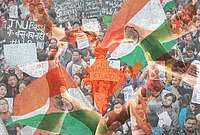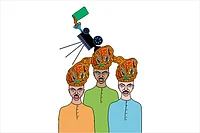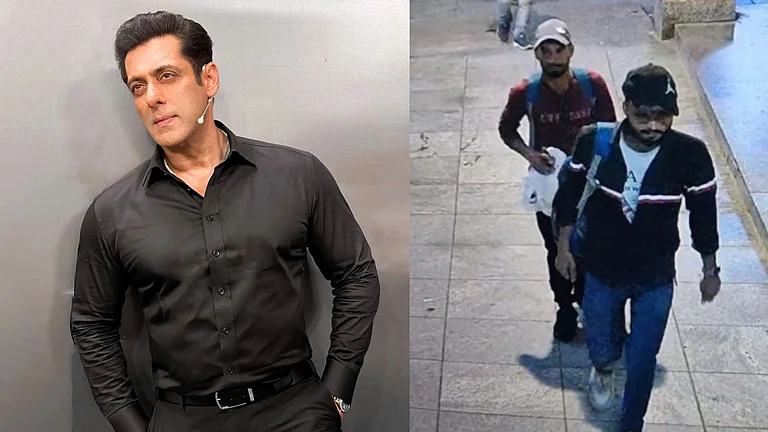Outlook Lens
Lok Sabha Elections 2024 Phase 2 Voting LIVE Updates: Polling for the second of the seven phases in the Lok Sabha elections or general elections 2024 is taking place on Friday, April 26. The voting, beginning 7 am, will take place in 88 constituencies across 13 states and Union Territories and will conclude at 6 pm. Among the many bigwigs from top political parties such as Bharatiya Janata Party and the Congress in fray in the second phase are Tejasvi Surya, Rahul Gandhi, Shashi Tharoor, Hema Malini, Arun Govil etc.
Advertisement
Lok Sabha Elections 2024 Phase 2 Voting: Polling will take place on Friday, April 26, in 88 constituencies across 13 states and Union Territories to decide the fate of several key political leaders, some of whom are Congress's Rahul Gandhi, Shashi Tharoor, BJP's Tejasvi Surya, Arun Govil, Hema Malini and Rajeev Chandrasekhar.
Latest
Advertisement
Taking cognisance of the situation, the Union Ministry of Fisheries, Animal Husbandry and Dairying asked the Jharkhand government to take immediate measures including the declaration of infected and surveillance areas, restricting access to infected premises, destruction of birds and disposal of dead birds and infected material.
Advertisement
Lok Sabha Elections 2024 Phase 2 Voting LIVE Updates: Polling for the second of the seven phases in the Lok Sabha elections or general elections 2024 is taking place on Friday, April 26. The voting, beginning 7 am, will take place in 88 constituencies across 13 states and Union Territories and will conclude at 6 pm. Among the many bigwigs from top political parties such as Bharatiya Janata Party and the Congress in fray in the second phase are Tejasvi Surya, Rahul Gandhi, Shashi Tharoor, Hema Malini, Arun Govil etc.
The spacecraft's three-member crew will relieve the Shenzhou-17 team, which has been manning China's Tiangong space station since last October.
Magazine
Magazine Home
-
Outlook reporters undertake this solemn guarantee towards readers and viewers that their report is genuine, it is unbiased, it is factual, it is objective, it is balanced, and above all, that it is true.
-
Tamil Nadu, a bastion of Dravidian political ideology, has always been a difficult terrain for the Bharatiya Janata Party (BJP)
-
Will the BJP’s desperate efforts to splinter the people along caste, religious, regional and linguistic fault lines bear fruit in Tamil Nadu’s western districts?
-
The Bahujan Samaj Party remains an enigma, but it has come up with a very smart game plan for the Lok Sabha elections
-
Can the 2024 Lok Sabha elections reverse the symbolic invisibilisation of Muslims from UP’s socio-political arena?
-
Nagina Lok Sabha constituency in Bijnor district has emerged as a key battleground for the future of Dalit politics in Uttar Pradesh
-
Arun Govil, who played Lord Ram in the popular television series, Ramayan, flips the conventions of devotion on the campaign trail
-
Politicians visiting Madhya Pradesh are making big promises to the people, but for the Adivasis, it’s still about Jal, Jungle, Jameen
-
In the calm foothills of the Eastern Himalayas, there is a storm brewing between the BJP and the TMC. The voters are divided
-
The BJP hopes to sweep Assam in the Lok Sabha polls riding on PM Modi and CM Himanta Biswa Sarma’s development and Hindutva agenda. The Opposition has constituency-specific strategies
-
Are Kashmiris set to heed politicians' call to come out and vote in large numbers?
-
While the Congress is deeply rooted in the city’s psyche, the BJP is eyeing 3.5 lakh Muslim voters
-
Udupi, Dakshina Kannada and Uttara Kannada—districts in coastal Karnataka, which witnessed increased instances of polarisation in the last few years—have been the BJP’s stronghold
-
Whether the Congress’ Rahul Gandhi or CPI’s Annie Raja wins, Wayanad has widened the chasm in the INDIA bloc
-
The resurgence of swords reinforces Hindutva’s fondness for Rajput rulers and Kshatriya pride and identity
-
The evolution from devotional egalitarianism to social justice
-
Ayodhya, a city of stark contrasts, where the echoes of devotion mingle with the modern chaos of daily life
Previous Issue
Advertisement
The Prasar Bharati Act of 1990 established the Prasar Bharati as an autonomous body to oversee the country's public broadcasting services and gave autonomy to Doordarshan and All India Radio
Explained: How RBI's Action On Kotak Mahindra Bank Will Affect Its Business
Royal Challengers Bengaluru defeated Sunrisers Hyderabad by 35 runs in match 41 of the Indian Premier League (IPL) 2024 at the Rajiv Gandhi International Stadium in Hyderabad on Thursday. Batting first, RCB amassed 206 runs on the board thanks to Rajat Patidar's quickfire fifty and Virat Kohli's patient half-century. Cameron Green played a crucial cameo in the end. He also picked two wickets while bowling. Will Jacks dismissed the destructive batter Travis Head in the first over to put SRH on the back foot from where they never recovered and kept losing wickets at regular intervals. They were restricted to 171/8 in 20 overs and hence RCB registered a win after six consecutive losses. Catch the highlights of the SRH Vs RCB match in the IPL 2024, here
Advertisement
Starring Gopichand, 'Bhimaa' is now available to stream on Disney+ Hotstar. Is this film worth watching or you can choose to skip it? Read the full review to find out.
Jennifer Lopez returns to the screen in 'Atlas', a high-octane action thriller that promises to keep audiences on the edge of their seats. Dive into our trailer review for a sneak peek of the excitement.
As Arijit Singh celebrates his 37th birthday today, did you know that the singer is slowly moving back to Jiaganj from Mumbai? Here's all the details.
Singer Paul Kim announced that he will be tying the knot with his long-term girlfriend. He shared the announcement on his official website.
The National Pension System (NPS) is a market-linked pension savings instrument with variable returns, while the Public Provident Fund (PPF) offers fixed returns set by the government.
OT Itinerary: How To Spend The Perfect 3 Days In Ooty

























































































































































![라이트닝 바카라 사이트 [ TOP 3 ]](https://media.assettype.com/outlookindia/2024-04/4beed037-a2b6-4824-b41b-ece0c6f8edaf/image1.png)



































